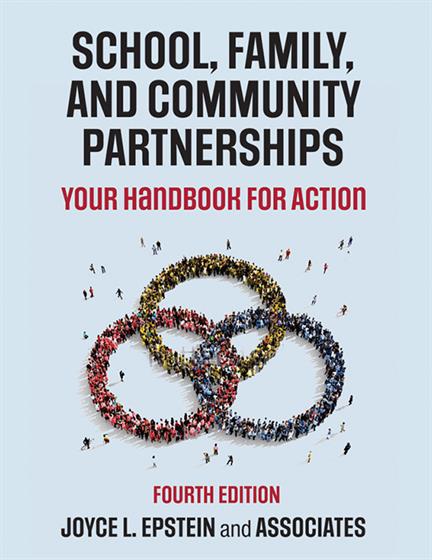Hands-on, Practical Guidance for Educators
From math,
literacy, equity, multilingual learners, and SEL, to assessment, school counseling,
and education leadership, our books are research-based and authored by experts
on topics most relevant to what educators are facing today.

School, Family, and Community Partnerships
Based on 30 years of research and fieldwork, this fourth edition of a bestseller will help educators develop effective and equitable programs of family and community engagement.
- Grade Level: PreK-12
- ISBN: 9781506391342
- Published By: Corwin
- Year: 2018
- Page Count: 384
- Publication date: August 14, 2018
Review Copies
Review copies may be requested by individuals planning to purchase 10 or more copies for a team or considering a book for adoption in a higher ed course. Request review copy
Description
Strengthen programs of family and community engagement to promote equity and increase student success!
When schools, families, and communities collaborate and share responsibility for students' education, more students succeed in school. Based on 30 years of research and fieldwork, the fourth edition of the bestseller School, Family, and Community Partnerships: Your Handbook for Action, presents tools and guidelines to help develop more effective and more equitable programs of family and community engagement.
Written by a team of well-known experts, it provides a theory and framework of six types of involvement for action; up-to-date research on
- Examples of best practices on the six types of involvement from preschools, and elementary, middle, and high schools
- Checklists, templates, and evaluations to plan goal-linked partnership programs and assess progress
- CD-ROM with slides and notes for two presentations: A new awareness session to orient colleagues on the major components of a research-based partnership program, and a full One-Day Team Training Workshop to prepare school teams to develop their partnership programs. (Also available at https://resources.corwin.com/partnershipshandbook)
As a foundational text, this handbook demonstrates a proven approach to implement and sustain inclusive, goal-linked programs of partnership. It shows how a good partnership program is an essential component of good school organization and school improvement for student success. This book will help every district and all schools strengthen and continually improve their programs of family and community engagement.
Author(s)

Joyce L. Epstein

Mavis G. Sanders

Steven B. Sheldon

Beth S. Simon

Karen Clark Salinas

Natalie Rodriguez Jansorn

Frances L. Van Voorhis

Cecelia S. Martin

Brenda G. Thomas

Marsha D. Greenfeld

Darcy J. Hutchins

Kenyatta J. Williams
Table of Contents
Acknowledgments
About the Authors
Introduction
1. A Comprehensive Framework
1.1. School, Family, and Community Partnerships: Caring for the Children We Share
1.2. School-Community Partnerships: The Little Extra That Makes a Big Difference
1.3. Improving Student Outcomes with School, Family, and Community Partnerships: A Research Review
2. Use the Framework to Reach School Goals—Stories from the Field
Six Types of Involvement to Improve School Climate and Student Success
3. Take an Action Team Approach
Organizing an Effective Action Team for Partnerships: Questions and Answers
4. Conduct Workshops
One-Day Team-Training Workshop
Components of a One-Day Team-Training Workshop
Planning an End-of-Year Celebration Workshop
5. Select Materials for Presentations and Workshops
Presentations and Handouts
Small Group Activities for Workshops
6. Strengthen Partnership Programs in Middle and High Schools
Improving School, Family, and Community Partnerships in Middle and High Schools
Predictors and Effects of Family Involvement in High Schools
A Goal-Linked Approach to Partnership Programs in Middle and High Schools
7. Strengthen District and State Leadership for Partnerships
Tools for District Leaders
Tools for State Leaders
Tools for District, Organization, and State Leaders
District and State Leadership for School, Family, and Community Partnerships
8. Implement Teachers Involve Parents in Schoolwork (TIPS)
TIPS Interactive Homework
TIPS Volunteers in Social Studies and Art
How to Implement Teachers Involve Parents in Schoolwork (TIPS) Processes
9. Evaluate Your Partnership Program
Evaluate Partnership Programs: Critical Considerations
Index
Reviews
School, Family, and Community Partnerships is one of our go-to resources. It takes us beyond the “why” of partnerships and gets to the “how.” It has everything you need to guide school-based Action Teams for Partnerships—from training modules to downloadable documents.
Sarah Del Toro, Family and Community Engagement Manager, Kennewick School District; Kennewick, WASchool, Family, and Community Partnerships is one of our go-to resources. It takes us beyond the “why” of partnerships and gets to the “how.” It has everything you need to guide school-based Action Teams for Partnerships—from training modules to downloadable documents.
Kennewick School District; Kennewick, WA
This Handbook is the gold standard for family and community partnerships. It makes clear connections between theory and practice. Epstein and her colleagues’ decades of research and experiences are organized into a simple-to-navigate and comprehensive resource. This book will guide both novice and experienced practitioners toward authentic goal-based actions that lead to measurable outcomes.
Tammy Pawloski, Professor and Director, Center of Excellence to Prepare Teachers of Children in Poverty, Francis Marion University, Florence, SCThis Handbook is the gold standard for family and community partnerships. It makes clear connections between theory and practice. Epstein and her colleagues’ decades of research and experiences are organized into a simple-to-navigate and comprehensive resource. This book will guide both novice and experienced practitioners toward authentic goal-based actions that lead to measurable outcomes.
Francis Marion University, Florence, SC
As a state organization supporting school districts and schools in establishing and sustaining effective family-school partnership programs, the School, Family, and Community Partnerships is our go-to resource. Everything we need to prepare staff, facilitate meetings, and evaluate practices, programs, and progress is right at our fingertips.
James Palmiero and Carol A. Good, Director and Assistant Director, Pennsylvania Training and Technical Assistance Network; Pittsburgh, PAAs a state organization supporting school districts and schools in establishing and sustaining effective family-school partnership programs, the School, Family, and Community Partnerships is our go-to resource. Everything we need to prepare staff, facilitate meetings, and evaluate practices, programs, and progress is right at our fingertips.
Pennsylvania Training and Technical Assistance Network; Pittsburgh, PA
This book has given us the tools we need to engage families in a systematic, sustained, and integrated program that supports student achievement and behavior. The Handbook is part of my daily practice when working with schools to promote family and community engagement.
Loree L. Smith, Federal Programs Coordinator, Calcasieu Parish School Board; Lake Charles, LAThis book has given us the tools we need to engage families in a systematic, sustained, and integrated program that supports student achievement and behavior. The Handbook is part of my daily practice when working with schools to promote family and community engagement.
Calcasieu Parish School Board; Lake Charles, LA
We believe that effective and equitable programs of partnership require multi-level leadership. When state, regional, and district leaders and school Action Teams for Partnerships use this practical book with its ready-made tools and training materials, they will see that working with parents as partners increases students’ learning and development.
Mimi Bandura and Ellen Larson, Consultants; Parent Engagement Leadership Institute, Riverside County Office of Education; Riverside, CAWe believe that effective and equitable programs of partnership require multi-level leadership. When state, regional, and district leaders and school Action Teams for Partnerships use this practical book with its ready-made tools and training materials, they will see that working with parents as partners increases students’ learning and development.
Riverside County Office of Education; Riverside, CA
Review Copies
Review copies may be requested by individuals planning to purchase 10 or more copies for a team or considering a book for adoption in a higher ed course. Request review copy
Related Resources
- Access to companion resources is available with the purchase of this book.
Join us for the Visible Learning
Conference in Las Vegas!
Experience groundbreaking research, inspiring speakers,
and transformative networking. Register Now.

